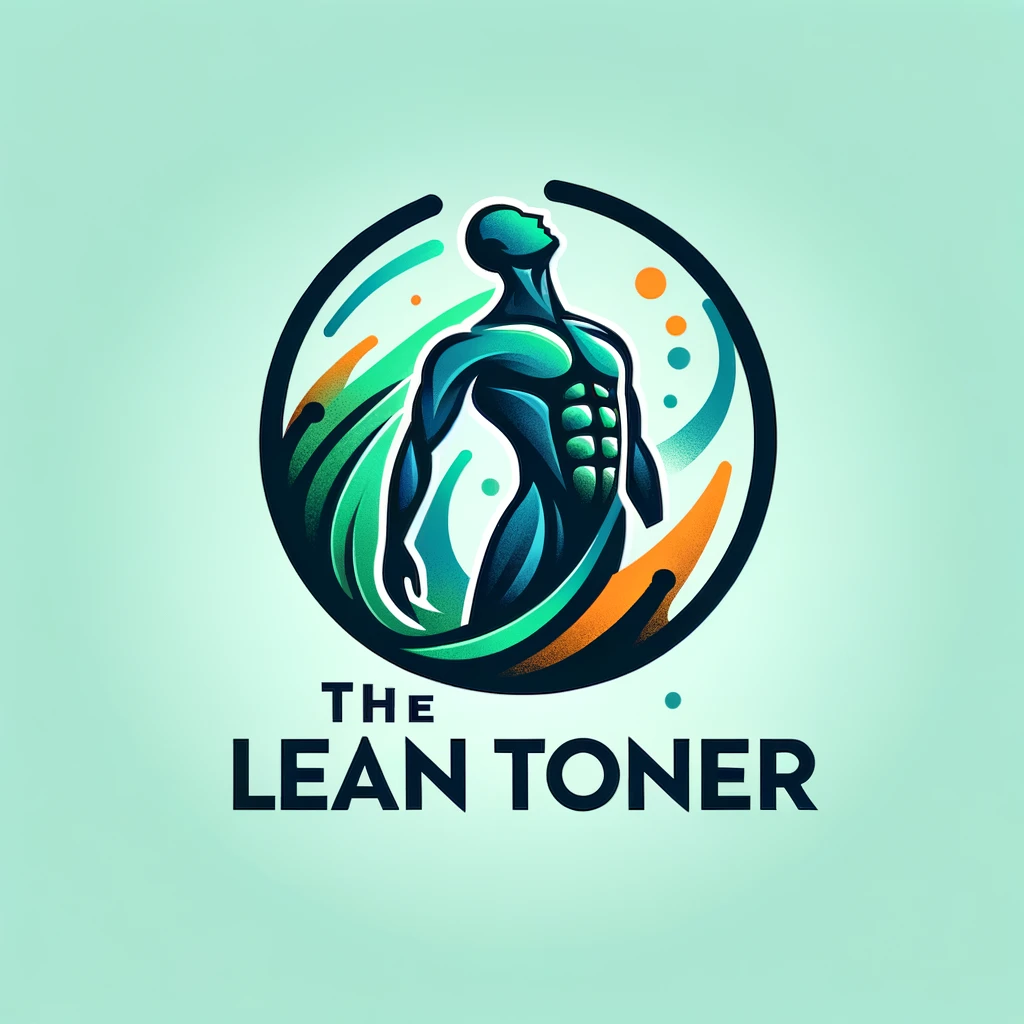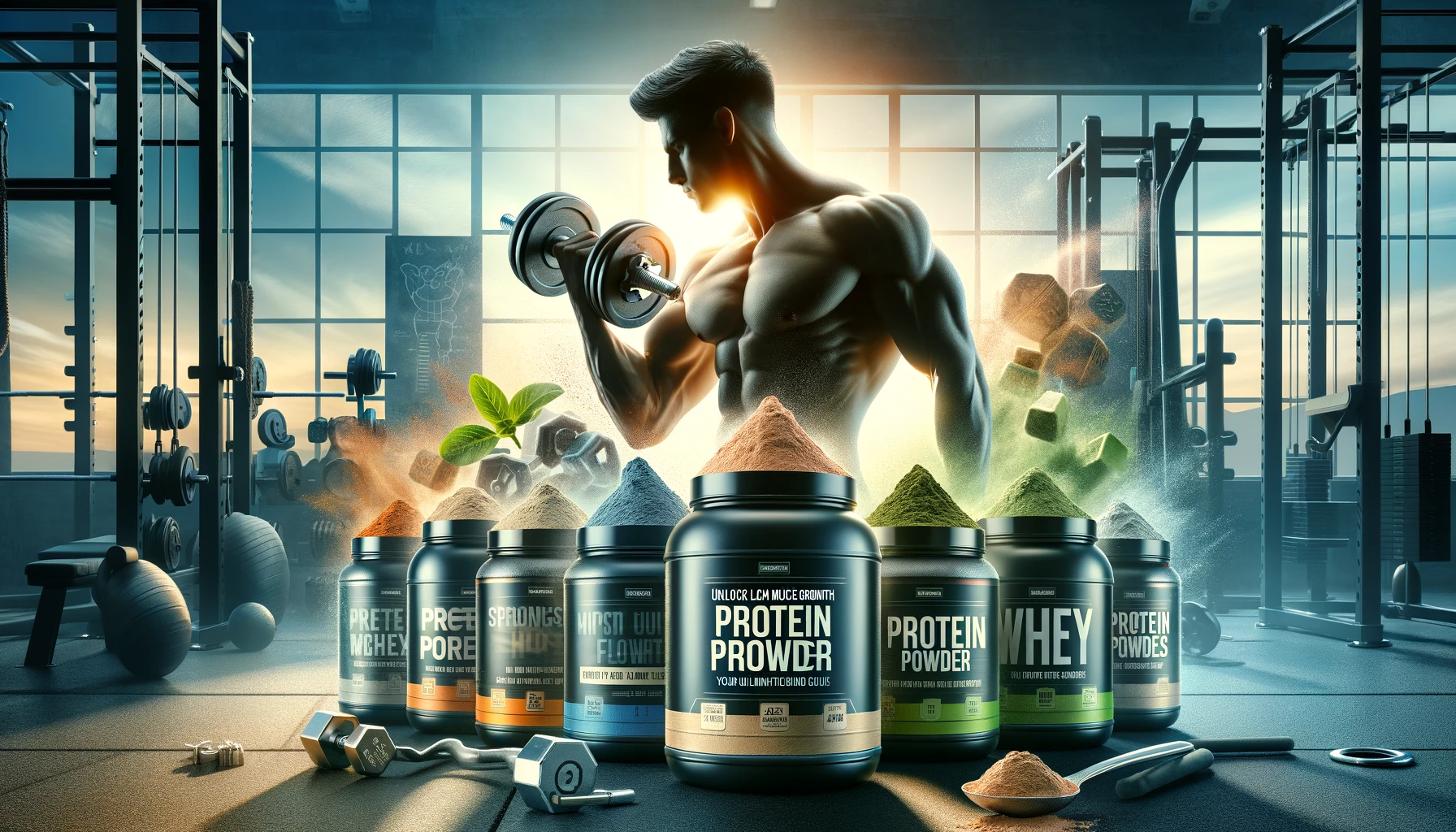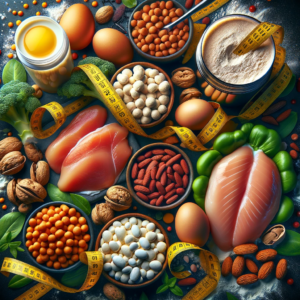The Essential Guide to Protein Powders for Lean Muscle Development
Protein is the cornerstone of muscle development; it’s the fuel that repairs and builds the fibers damaged during a strenuous workout. But with the myriad of supplements on the market, it can be a challenge to determine which protein powder will most effectively help you develop lean muscle. This guide is designed to demystify protein powders, giving you the knowledge you need to make the best choice for your fitness goals.
Introduction
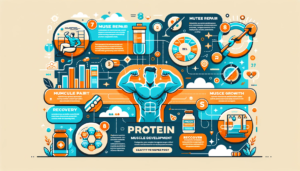
Protein isn’t just a buzzword your gym buddies throw around – it’s a critical macronutrient that plays a vital role in building and maintaining muscle mass. For those on a quest for a leaner physique, the right protein supplement can make all the difference. But with so many options available, how do you choose the one that’s right for you?
In this comprehensive guide, we’ll delve into the science of protein powders and their impact on muscle development. We’ll explore how they can complement your fitness regimen and help you sculpt the lean, muscular body you’re aiming for. Whether you’re a seasoned athlete or just starting your fitness journey, this article will equip you with the knowledge to select the perfect protein powder for your needs.
The Science Behind Protein and Muscle Development
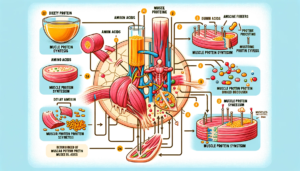
Proteins are the building blocks of muscle tissue. When you exercise, particularly during weight training, you create micro-tears in your muscle fibers. Protein steps in to repair these tears, which not only helps the muscles recover but also allows them to grow stronger and larger.
Key Points:
- Muscle Repair and Growth: Protein is essential for the repair and growth of muscle tissue post-exercise.
- Enhancement through Supplementation: Protein powders can provide a convenient and concentrated source of high-quality protein, making it easier to meet your daily protein needs for muscle development.
A study by the International Society of Sports Nutrition states that “Protein intake is crucial for muscle mass gain, particularly in combination with resistance training.” Moreover, they recommend an optimal daily protein intake for athletes of 1.6-2.0 grams per kilogram of body weight. This highlights the importance of not just any protein, but high-quality protein, like that found in many protein powders.
Evaluating Protein Powders: What Builds Lean Muscle?
Selecting the best protein powder for muscle development involves understanding what your body needs to build lean muscle effectively. A protein powder that supports lean muscle development should have a high biological value, providing essential amino acids that are easily absorbed by the body.
Considerations When Choosing Protein Powders:
- Biological Value (BV): The measure of how efficiently the body can utilize the protein consumed.
- Amino Acid Profile: Look for a complete amino acid profile, which includes all nine essential amino acids.
- Absorption Rate: Different protein sources digest at different rates, which can be tailored to your workout routine.
Whey protein, for example, is known for its high BV and fast absorption rate, making it ideal for post-workout recovery. When it comes to building lean muscle, whey protein isolate, in particular, is often considered the “number one” choice due to its high protein content and minimal fat and lactose.
The Best Protein Shakes for a Lean Body
The best protein shake for a lean body is one that aligns with your dietary preferences, fitness goals, and nutritional requirements. For those looking to minimize fat gain while maximizing muscle development, a protein shake with a high protein-to-calorie ratio is essential.
Top Picks for Protein Powders:
- Whey Protein Isolate: High in protein, low in carbs and fats, and fast-absorbing – great for post-workout.
- Casein Protein: Slow-digesting, providing a steady release of amino acids, making it ideal for nighttime consumption.
- Plant-Based Proteins: For those with dietary restrictions, plant-based proteins like pea, rice, or hemp can be excellent alternatives.
Creating your protein shake is not just about the powder you choose; it’s also about what you mix it with. For the leanest shake, consider blending your protein powder with water or a low-calorie plant-based milk alternative and avoiding added sugars.
Protein Powder and Fat Loss: The Cutting Edge
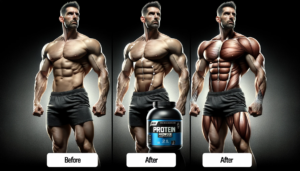
Protein powders can be a powerful ally in your fat-loss arsenal. They can help preserve lean muscle mass while on a calorie deficit, ensuring that the weight you lose is predominantly fat.
Strategies for Using Protein Powder During Cutting:
- High-Protein Diets: A higher protein intake can increase satiety and reduce overall calorie consumption.
- Thermic Effect of Food (TEF): Protein has a higher TEF compared to fats and carbohydrates, meaning your body expends more energy digesting protein, which can aid in fat loss.
- Muscle Preservation: Adequate protein intake is essential for preserving muscle mass during periods of calorie restriction.
In a study on whey protein supplementation, it was found that participants who supplemented with whey protein while engaging in resistance training saw significant increases in muscle mass and strength. This underscores the effectiveness of protein powder in aiding muscle development while potentially reducing body fat.
Supplements for Lean Muscles: Beyond Protein Powders
While protein powders are a key component in building lean muscle, they are just one piece of the puzzle. Other supplements can support muscle growth and overall health.
Supplements to Consider:
- Creatine: Supports increased strength and muscle mass.
- Branched-Chain Amino Acids (BCAAs): May aid in muscle recovery and reduce exercise fatigue.
- Omega-3 Fatty Acids: Can help reduce inflammation and support cardiovascular health.
It’s important to note that supplements should complement, not replace, a well-rounded diet and exercise regimen.
Dosage and Timing: How Many Protein Shakes a Day?
The number of protein shakes you should consume daily depends on your total protein requirements, which are influenced by factors like your weight, activity level, and muscle-building goals.
General Guidelines:
- Post-Workout: Consuming a protein shake within 30 minutes after exercise can optimize muscle repair and growth.
- Throughout the Day: Spreading protein intake across meals can ensure a consistent supply of amino acids to your muscles.
For most people, one to two protein shakes per day, in conjunction with whole food sources of protein, are sufficient to meet their protein needs.
The Impact of Protein Shakes without Exercise
Consuming protein shakes without engaging in regular exercise can lead to an excess intake of calories, which may result in weight gain rather than lean muscle development. It’s crucial to balance your protein shake consumption with an appropriate level of physical activity.
Protein Shakes and Weight Loss: A Balancing Act
Protein shakes can be a valuable tool for weight loss when used as part of a calorie-controlled diet. They can provide a convenient and satisfying way to increase protein intake, which can aid in preserving lean muscle mass while losing fat.
Tips for Using Protein Shakes for Weight Loss:
- Choose Low-Calorie Mixers: Mix your protein powder with water or a low-calorie liquid to keep the shake’s calorie content down.
- Monitor Your Total Calorie Intake: Keep track of your overall calorie consumption to ensure you’re in a calorie deficit for weight loss.
Daily Protein Shake Consumption: Pros and Cons
Daily protein shake consumption can be beneficial for meeting your protein needs, especially if you have a busy lifestyle or struggle to consume enough protein through food alone. However, it’s essential to not rely solely on protein shakes and to incorporate a variety of protein sources in your diet to benefit from different nutrients and amino acid profiles.
Choosing the Best Protein Powder for Your Needs
When selecting a protein powder, consider your individual needs, such as any dietary restrictions, taste preferences, and specific fitness goals.
Factors to Consider:
- Protein Content: Look for powders with a high protein-per-serving ratio.
- Ingredient Quality: Choose powders with minimal additives and high-quality protein sources.
- Dietary Restrictions: Consider any allergies or intolerances, such as lactose intolerance or a preference for plant-based products.
For beginners, a straightforward whey protein concentrate may be a good starting point, while women may seek out powders with added iron or calcium. Those looking for muscle gain with minimal additives might opt for a pure whey protein isolate or a natural plant-based protein.
Plant-Based Options: The Green Muscle Builders
For those following a vegetarian or vegan diet, or for individuals with lactose intolerance, plant-based protein powders offer an effective alternative for muscle building.
Plant-Based Protein Highlights:
- Soy Protein: A complete protein that is comparable in effectiveness to whey for muscle growth.
- Pea Protein: Rich in BCAAs, which are critical for muscle building.
- Hemp Protein: Provides a source of omega-3 fatty acids in addition to protein.
According to a review on plant-based protein powders, “Soy protein is the most well-studied plant-based protein for muscle growth and appears to be similar in effectiveness to whey protein.” This makes soy protein a strong contender for those seeking plant-based options.
Practical Tips for Selecting and Using Protein Powders
When choosing a protein powder, it’s important to look beyond the marketing and examine the label for the information that truly matters.
Label Reading Tips:
- Check the Protein Source: Ensure the protein is from a high-quality source and fits your dietary needs.
- Examine the Serving Size: Compare the protein content per serving size to get the most bang for your buck.
- Look for Third-Party Testing: Certifications can provide assurance of the product’s quality and purity.
Once you’ve selected your protein powder, experiment with different recipes and flavors to find shakes that you enjoy and that fit into your diet seamlessly.
Conclusion
Protein powders are a versatile and effective tool for anyone looking to build lean muscle mass. By understanding the science behind protein and muscle development, evaluating protein powders based on quality and effectiveness, and considering your individual needs and goals, you can make an informed choice that will support your journey towards a leaner, stronger physique.
FAQs
- How many protein shakes should I drink a day to gain muscle?
- It depends on your individual protein needs, but typically one to two shakes a day in addition to whole food sources of protein is sufficient.
- What happens if I drink protein shakes without working out?
- Without exercise, excess protein can lead to weight gain rather than muscle development.
- Can I drink protein shakes for weight loss?
- Yes, when used as part of a calorie-controlled diet, protein shakes can help preserve lean muscle mass during weight loss.
Call to Action
Ready to take your muscle-building efforts to the next level? Explore our selection of high-quality protein powders tailored for lean muscle development and start fueling your fitness journey today.
